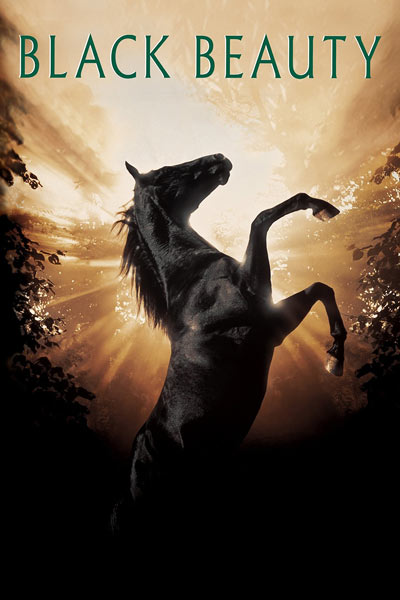Black Beauty (1994)
Genre: Drama | Age: 8-9
AGE RECOMMENDATIONS New Search
Ages 4 & under No
Ages 5 to 7 With Guidance
Ages 8 to 9 Yes
Ages 10-12 Yes
Ages 13-15 Yes
Ages 15-17 Yes
ANIMAL DRAMA: 1994, G. The sentimental and romantic story of a stallion, Black Beauty, traded to various owners, told and narrated from the horse’s point of view. At three years, after some training, young Black Beauty joins squire Gordon’s family. There he falls in love with a mare, Ginger. The squire’s family is very kind, especially the groom’s young son, Joe, and Black Beauty thinks life is wonderful. During a terrible storm, he saves his master’s life, but falls deathly ill himself. Joe and the rest of the family care for him and he recovers. However, because of his mistress’ illness, the family must move to a warmer climate and the horses are sold. Black Beauty’s new home is much fancier, but the people, interested only in fashionable looking horses and not horses as beings, torture them. The groom gets drunk and rides Black Beauty with a loose shoe, causing severe injury. Ginger is raced before being properly trained and it takes her a year to recover. Black Beauty is then sold to a horse rental establishment where he is mistreated and is very unhappy. Finally, Jerry, a kindly cab driver, buys him. While the work is hard, he is treated with kindness and becomes one of the family. He discovers that Ginger has died from overwork and starvation. When Jerry gets sick and must live in the country, Black Beauty is again abused and almost dies. Finally, Joe (remember him?), now an adult, buys the horse and cares for him in his old age.
VIOLENCE/SCARINESS: The storm and the fire are very threatening. The sounds of horses in pain and illness are very disturbing. Black Beauty sees Ginger’s corpse on a cart. The way the horses are abused and tortured is clearly explained – tight cinches, heavy loads, etc.
CRIMES: None (except 19th century cruelty).
MORALS, ISSUES & VALUES: “Kind treatment makes good horses” is a metaphor for dealing with people. “People aren’t thoughtless just to their horses, they’re cruel to each other.” Black Beauty falls ill from ignorant treatment rather than malice. The horse has flatulence seemingly as a social comment on the aristocracy. Horses are taught to remain loyal to their masters, no matter what. Horses don’t get to choose their masters (as children don’t get to choose their parents). Black Beauty constantly senses danger and tries desperately to tell the humans around him, but they don’t understand. It is implied that the knowledge of the natural world surpasses that of humans. According to the film: Hard work is not a problem with a kind and understanding boss. Friendships are made for life.
SEXUALITY & GENDER ISSUES: Nuclear families. Black Beauty’s birth in the first few moments of the film is very graphic and very beautiful. Good people and bad people are equally distributed by gender, age and class.
SUBSTANCES: The gruff groom, Rupert, smokes a pipe that starts a fire. Later he gets very drunk and rides Black Beauty with a loose shoe and severely damages the horse’s knees.
BOOK: Anna Sewell, “Black Beauty.”
COMMENTS: A beautiful and often sad portrayal of life in 19th century England, both in the countryside and the city. What happens to children in a Dickens novel (a life of hardship and abuse ending in modest happiness), is what happens here to a horse. Anyone seeing this film will doubtless treat horses, and perhaps all animals, with more respect.
STARRING: Mona Freeman, Richard Denning, Evelyn Ankers, Terry Kilburn, Arthur Space, J. M. Kerrigan.
CONTENT REVIEW (1-5)
Nudity 0Sex 2
Physical Violence 4
Emotional Stress 4
Blood 2
Language/Profanity 0
Immorality 3
Parental Guidance 2
Watchability for Adults 4
Overall 4
